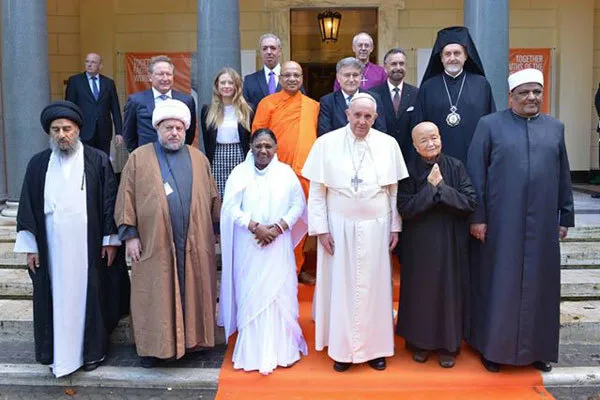Article Courtesy – Faiyaz Jaffar | The Huffington Post

The Need for Interfaith Dialogue in America
A Call for Unity in Troubled Times
In December 2014, faith leaders from around the globe gathered at the Vatican to sign a historic declaration against modern slavery. That act of unity symbolized hope—hope that people of faith could come together for a shared cause. But here in the United States, we need more such initiatives to demonstrate solidarity and compassion across religious boundaries.
Each morning, as we scroll through our phones, our screens flood with heartbreaking images—war-torn children, bombings, and stories of despair. We sigh, share our thoughts, and move on. Yet, the suffering we witness daily—like the Yazidi teenager who took her own life to escape ISIS or the image of Omran, a child covered in dust and blood—should push us to act.
The question remains: how much more tragedy must we see before we recognize that interfaith cooperation is not just desirable—it’s essential?
Religious Intolerance: A Global Crisis
Across the world, religious intolerance continues to fuel violence and division. From Burma to Egypt, from China to Iraq, minorities suffer persecution both from governments and extremist groups. This isn’t just a foreign issue—it’s one that touches us at home, too.
As an American Muslim faith leader, I’ve witnessed the sharp rise of Islamophobia firsthand. From discriminatory rhetoric to tragic acts of violence, such as the murder of an Imam in New York, our society is grappling with fear and misunderstanding. Yet, amid this turmoil, I remain optimistic. America still holds immense potential to heal divisions and foster understanding through meaningful interfaith dialogue.
Building Bridges, Not Barriers
The responsibility to create positive change doesn’t rest solely with politicians or religious leaders—it starts with each of us. I refuse to raise my daughter in a world where intolerance defines who we are. The first step toward change is acknowledging that intolerance exists and that we have a collective duty to address it.
America’s ongoing struggles with racism, discrimination, and inequality highlight how far we still have to go. But progress begins with conversation. Just as we discuss gender equality or racial justice, we must also speak openly about religious prejudice. Admitting that we have a problem is not a sign of weakness—it’s the foundation of growth.
Focusing on Common Ground
Interfaith dialogue thrives on the principle of commonality. As the Qur’an teaches (Chapter 3, Verse 64):
“Say: Oh People of the Book (Jews and Christians)! Come to a word common between us and you…”
The aim of dialogue isn’t to debate or convert—it’s to connect. When faith leaders gather at synagogues, churches, mosques, and universities, they discuss shared values like peace, mercy, justice, and compassion. These conversations humanize us, turning labels into friendships.
Even everyday discussions—about food, hobbies, sports, or family—can break down barriers. When we focus on what unites us rather than what divides us, we begin to see each other not as “the other,” but as fellow human beings.
Embracing Our Differences
America’s greatest strength lies in its diversity. Our differences—religious, cultural, linguistic—shouldn’t separate us but inspire us. Embracing diversity allows us to live by the Golden Rule:
“So whatever you wish that others would do to you, do also to them.” (Matthew 7:12)
Imam Ali, the son-in-law of Prophet Muhammad, beautifully expressed this truth:
“People are of two types: either your brother in faith or your equal in humanity.”
Imagine a nation where we lived by those words—where acceptance replaced suspicion, and kindness overpowered hate. That’s the America interfaith dialogue can help build.
Interfaith Dialogue: A Practical Path Forward
Interfaith dialogue won’t singlehandedly end global conflicts or erase centuries of prejudice. But it’s a meaningful start. Through open discussion, education, and compassion, we can challenge stereotypes and soften hardened hearts.
Most importantly, interfaith dialogue can shape a world where the next generation—like my daughter—grows up unafraid. A world where she’s judged not by her faith, but by her character.
That is the promise of interfaith dialogue in America: not perfection, but progress. Not uniformity, but unity.
Conclusion
If we are to truly live up to our ideals of liberty and equality, interfaith dialogue must move from occasional gatherings to a way of life. By talking, listening, and respecting one another, Americans can transform division into understanding and prejudice into peace.
It starts with one simple act: a conversation.
External Link for Further Reading:
👉 United States Institute of Peace: Interfaith Dialogue Resources
Who are people of the book?
https://interfaithmarriages.org/understanding-the-people-of-the-book/
Is Hinduism a Monotheistic religion
https://interfaithmarriages.org/is-hinduism-a-monotheistic-religion-a-deep-dive-into-beliefs-and-misconceptions/
Mini-Pluralism Workshop
https://interfaithmarriages.org/mini-pluralism-workshop-what-is-my-loss-the-power-of-respect-and-harmony/

